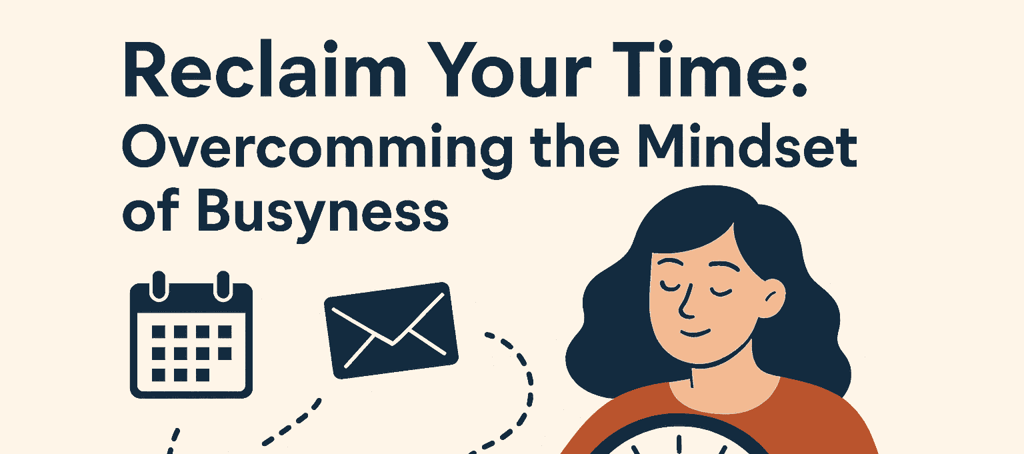Reclaim Your Time: Overcoming the Mindset of Busyness
mindset of busyness is often seen as a badge of honor. However, this mindset problem can lead to stress and burnout. Discover how to shift your perspective on busyness and improve your work-life balance to reclaim your time and enhance your productivity.
Why “Busy” Is a Mindset Problem (And How to Reclaim Your Time Today)
Many people in today’s fast-paced world boast about how busy they are. Busyness has become a status symbol, wrongly equated with productivity, importance, and success. But this relentless pace often causes stress, burnout, and a sense that time is always in short supply. The actual issue? “Busy” is not a reflection of how much you have to do, but a mindset problem. Grasping this change will dramatically alter how you approach your time, work, and life.
The Culture of Busyness: Why We Celebrate Being Busy
: In today’s world, people are judged by how much they accomplish. Social media amplifies this with posts showcasing hectic schedules, back-to-back meetings, and packed calendars as evidence that you’re leading a meaningful life. This cultural story, however, frequently misses a vital truth: being busy isn’t the same as being productive or happy.
Busy versus productive: Busy work includes tasks that fill time but do not move you closer to your goals.
The illusion of urgency: Constantly reacting to notifications, emails, and last-minute requests keeps people in a reactive, rather than proactive, state.
Work-life imbalance is frequently caused by excessive busyness, disrupting the natural equilibrium between work, rest, and personal life, and leading to exhaustion.
Busy Is a Mindset: What Does That Mean?
When we say busy is a mindset problem, we mean the way you think about your tasks and time influences how overwhelmed you feel. It’s more about perception than the actual number of tasks.
Mental framing shapes experience: if you view “busy” as chaos or punishment, you feel stressed and drained. But if you reframe your mindset to view commitments as choices aligned with your priorities, you gain control.
Choosing busyness unconsciously: Often, busyness becomes a habit or a default state rather than a conscious choice.
Perfectionism and endless to-do lists: A mindset fixated on perfection and an overflowing task list can trap you in busyness without progress.
The Science Behind the Busy Mindset
Neuroscience and psychology explain why a busy mindset is so common and challenging to change:
Stress response activation: When you feel overwhelmed, your brain enters a fight-or-flight mode, limiting your ability to think clearly or prioritize.
Attention fragmentation: multitasking or switching frequently between tasks depletes cognitive resources, leaving you feeling tired and inefficient.
Cognitive overload: Too many demands without breaks cause “decision fatigue,” where your brain struggles to make choices or stay focused.
Understanding this explains why simply having more hours in the day won’t solve the problem; your mindset needs change first.
How to Shift from Busy to Balanced: Practical Mindset Changes
The good news is that reclaiming your time and peace is possible by changing your mindset. Here are proven strategies for reclaiming your time and peace:
1. Prioritize Like a Pro
Identify your most important tasks—those that align with your long-term goals and values—and give them priority. By changing your mindset, you can move from responding to urgent requests to proactively concentrating on what’s truly important.
Use frameworks like the Eisenhower Matrix to distinguish urgent from important.
Accept that you can delegate or eliminate some unnecessary busywork.
2. Embrace “Less is More,”
Busy individuals often believe that doing everything is necessary. Abandon the myth of perfection. Instead, practice intentional minimalism in work and commitments.
Reflect on this: what am I able to decline? Check how much work you already have before taking on more.
Saying no is a way to take care of yourself and be more productive.
3. Build Mindful Awareness Around Your Time
Mindfulness trains your brain to notice when you’re slipping into reactive busyness.
Set daily check-ins to assess how you’re spending your time.
Use time-blocking to create focused periods for work and rest.
4. Break Tasks Into Manageable Pieces
We often feel overwhelmed because we perceive extensive projects as too big to handle. To overcome mental blocks, divide your work into smaller, manageable tasks.
5. Practice Self-Compassion and Flexibility
Busyness often worsens because people are hard on themselves for not doing enough. Cultivate kindness towards yourself and allow flexibility in your schedule.
The Benefits of Fixing the Busy Mindset
Rethinking how you view being busy profoundly affects your personal and professional well-being.
Focusing on what matters most improves both productivity and the quality of work, resulting in real achievements.
Better mental health results from less stress and burnout, leading to greater well-being.
Stronger relationships blossom with dedicated time and attention to loved ones and yourself.
Managing your time effectively contributes to greater life satisfaction.
Why “Busy” Culture Is Unsustainable — And What Leaders Need to Know
Companies often promote a culture of busyness, making employees multitask without clear priorities. Consequently, productivity suffers and employees leave more frequently. Leaders need to understand.
Productivity increases when employees are encouraged to focus and take breaks.
Changing how we think about being busy is an example for others to follow.
Time management and mindfulness training improve team performance.
Final Thoughts: Reframe Your Relationship With Busy
Being busy shouldn’t be something to brag about; it’s a sign you’re not focusing on what truly matters. Understanding that busyness is a matter of mindset, not just schedule, allows you to control the pace and direction of your life. Intentional time management contributes to a more productive and satisfying life.
Awareness and conscious decision-making are crucial first steps for anyone seeking respite from a busy life. Let’s stop praising our busy lives and start living purposefully today.

